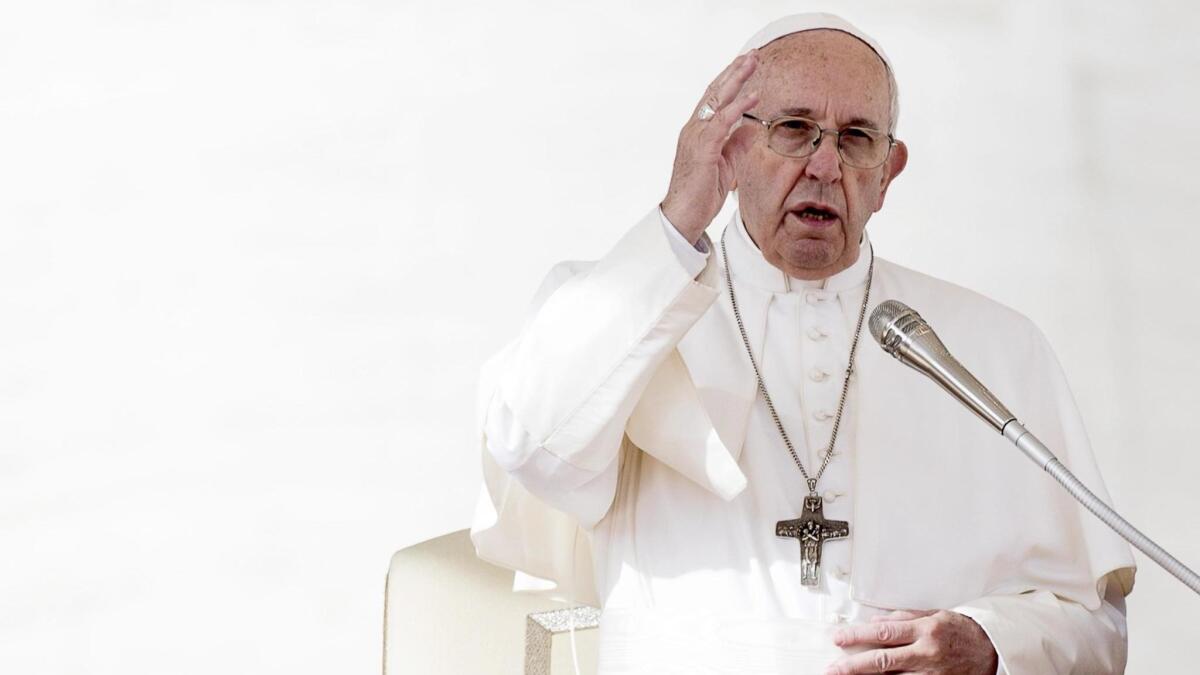Vatican asks U.S. bishops not to vote on their proposals to address sexual abuse

- Share via
The bishops of America’s 196 Catholic dioceses and archdioceses gathered in Baltimore on Monday morning, meeting for the first time since sexual abuse scandals rocked the church in the summer. They planned to vote on measures to tackle the crisis and prevent further crimes.
In the opening minutes of their meeting, the bishops heard a surprising report: Pope Francis had asked them not to vote on any of their proposals.
The pope does not want U.S. bishops to act to address bishops’ accountability on sexual abuse until he leads a worldwide meeting in February of church leaders, the president of the U.S. Conference of Catholic Bishops, Cardinal Daniel DiNardo, told the gathered bishops as the meeting opened Monday morning.
“At the insistence of the Holy See, we will not be voting on the two action items,” DiNardo said. He said he was “disappointed” by the pope’s directive.
Anne Barrett Doyle, co-director of BishopAccountability.org, called the last-minute order from the Vatican “truly incredible.”
“What we see here is the Vatican again trying to suppress even modest progress by the U.S. bishops,” said Doyle, whose group compiles data on clergy abuse in the church. “We’re seeing where the problem lies, which is with the Vatican. The outcome of this meeting, at best, was going to be tepid and ineffectual, but now it’s actually going to be completely without substance.”
As soon as the bishops heard DiNardo’s announcement, Archbishop Christophe Pierre — the Vatican’s ambassador to the United States — gave a lengthy address, in which he defended what the bishops have already done to reduce instances of clergy abusing children and expressed hesitation about anyone other than clergy, like lay leaders or civil authorities, punishing clergy abuse.
“There are many calls for reform in the church, particularly among the present crisis. You yourselves have expressed a greater desire for accountability and transparency,” he said. But then Pierre, a French bishop sent by Francis to Washington in 2016, quoted a French author who said that “whoever pretends to reform the church with the same means to reform temporal society” will “fail.”
“There may be a temptation on the part of some to relinquish responsibility for reform to others from ourselves, as if we were no longer capable of reforming or trusting ourselves,” said Pierre, who seemed to refer obliquely to both the bishops’ now-tabled proposal to establish a lay commission capable of investigating bishops’ misconduct, and also the more than dozen U.S. states’ ongoing criminal and civil investigations into crimes committed by priests. “Assistance is both welcome and necessary, and surely collaboration with the laity is essential. However, the responsibility as bishops of this Catholic Church is ours.”
Zauzmer and Boorstein write for the Washington Post.
More to Read
Sign up for Essential California
The most important California stories and recommendations in your inbox every morning.
You may occasionally receive promotional content from the Los Angeles Times.










